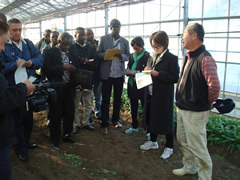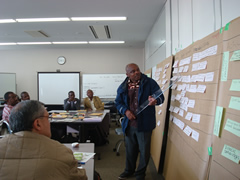Region-wide expansion of the SHEP approach kicked off with a SHEP training course titled "Market-Oriented Agriculture Promotion Planning and Management)", which was carried out in Japan and Kenya for extension workers and government officials involved in agricultural extension in developing countries. When it was discovered that governments in numerous African countries wanted to participate in the same program, the expansion began. Governments expressing interest consulted with the JICA office in their country, and then selected candidates to participate in the training from among those involved in their local agricultural extension projects.
Training participants learn the basic principles of the SHEP approach in Japan and learn from various people involved with Japanese farming how to engage in agriculture as a business. Then, staff members from Kenya who have accumulated a variety of SHEP experiences in their home country teach participants about SHEP initiatives. Participants also get a chance to observe farms that have been successful as a result of the SHEP program. Through these experiences, trainees see the practical value of the SHEP approach and understand how to apply it. They also prepare an action plan for implementing agricultural extension and services using the SHEP approach in their home countries.
Once the trainees return home, they discuss the human, financial, and other resources available, then implement the action plan they created during the training course. Action plan implementation is partially a trial-and-error process, but JICA also provides technical advice through its project consultation teams and regional experts to support returnee's efforts. Once some progress has been made on the action plan and it has started to show results, JICA may further support the country through a technical cooperation project if they feel there is potential to expand those results and further strengthen independent development. This was the case in Malawi, Senegal, and Ethiopia, for example.
In some cases, even countries where JICA technical cooperation or other projects designed to enhance agricultural extension have already been carried out participate in the thematic training described above. When that happens, trainees create an action plan designed to improve the projects that they are currently implementing using the SHEP approach.

Case studies on initiatives carried out in various countries to strengthen agricultural extension services through the introduction of the SHEP approach are shared every year at a workshop held in South Africa. This workshop is attended not only by returned trainees, but also by government officials in developing countries that are involved in agricultural extension projects, JICA experts, and other donors. The event is an opportunity for the various participants to engage in lively feedback sessions with the aim of further improving agricultural extension services. Capacity-building training for development consultants is also held in Japan with the aim of developing Japanese experts who are thoroughly versed in the SHEP approach.
So far, JICA has primarily been targeting Africa for region-wide SHEP expansion. In the future, our policy is to make use of our past achievements as we take the SHEP approach even further—to Central America and other regions around the world.






scroll